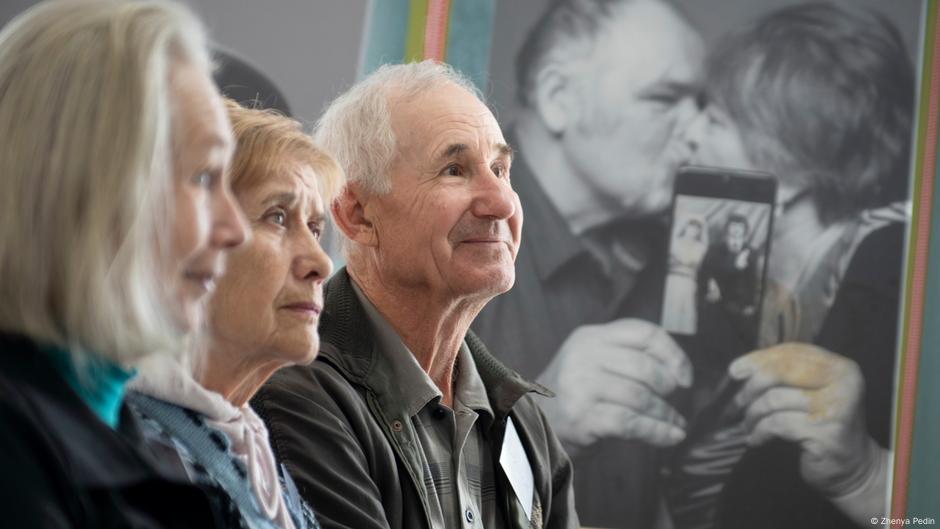Listen to the article
The war in Ukraine has intensified the spread of disinformation across the internet, creating a particularly challenging environment for older citizens to navigate online information. A specialized course developed by the Ukrainian Media and Communication Institute and DW Akademie is helping seniors develop crucial skills to distinguish truth from fiction in this complex digital landscape.
Yurii Volik, a 75-year-old retired flight school instructor and high school teacher living near Kyiv, is among those who have benefited from the program. Despite being comfortable with technology since getting his first computer in 2007 and having years of internet experience, Volik often found himself questioning online content.
“I’ve often come across disinformation while online,” Volik explained. “But I now pay closer attention to the author — whether the person is anonymous, the source of the information and whether there are references. I see deception a lot in medical advertisements, in news reporting and in false information on topical issues such as the war, negotiations and politics.”
The course, titled “Increasing Media Literacy Among Elderly People,” targets Ukrainians over 60 years of age and provides comprehensive training in social media literacy, identifying AI-generated content, recognizing online deception, and effective mobile communication. Sessions are offered both in-person and online, meeting participants at their technological comfort level and gradually building their skills.
In a country currently at war, these skills take on critical importance. As George Orwell noted, truth is typically the first casualty of conflict, and Ukraine is no exception. Information analysis has become a crucial line of defense against propaganda.
“Media and information literacy education is extremely important because we in Ukraine are living in a state of war,” said trainer Inna Yermakova, “and not only an armed war, but also a war of meanings, information, narratives and history. And people are very reluctant to part with their opinions.”
A particular challenge for many seniors is confronting biases formed during the Soviet era. Diana Dutsyk, executive director at the Ukrainian Media and Communication Institute, noted that Russian propaganda deliberately exploits nostalgic sentiments among older Ukrainians who grew up during the Soviet period.
“Russian propaganda today exploits certain nostalgic weaknesses of this audience and uses them to achieve its goals,” Dutsyk explained. Breaking these long-established patterns requires sensitivity and patience from trainers, who must establish trust with participants.
Oksana Pochapska, one of the online course trainers, emphasized that maintaining balance in their approach is crucial. “At first, you are ‘some kid who came to explain something to them,'” she said. “It’s important to maintain a balance between being that young person who is willing to listen to their life stories. For a trainer who will gently try to adjust those perceptions, show another perspective, provoke reflection and discussion, and encourage them to search for primary resources, keeping that balance is probably the hardest part.”
The trainers have found that participants’ backgrounds, including their previous professions and whether they come from urban or rural areas, influence their learning pace more than age itself. Many participants are eager to learn despite initial hesitations.
Lidia Malovana, a 78-year-old former safety engineer, admitted feeling embarrassed by her limited smartphone skills before taking the course. “It used to feel impossible for me,” she shared. “Children use it so easily, while I could only make phone calls. But now, after the training, and all those scam messages that come — I already know not to let myself be deceived.”
Beyond technical skills, the training teaches impulse control – helping participants resist the urge to immediately react to or share information they encounter. This ability to pause and evaluate information critically becomes especially valuable during wartime, when misinformation can spread panic.
“MIL is a vital skill that helps one navigate the turbulent information flows we face today,” Pochapska explained. “It allows people to remain calm, avoid spreading panic and maintain a clear understanding of the situation when it feels like the world is collapsing.”
The project is implemented with financial support from the German Federal Ministry for Economic Cooperation and Development, offering Ukrainian seniors valuable tools to defend themselves in the ongoing information war that parallels the physical conflict in their country.
Fact Checker
Verify the accuracy of this article using The Disinformation Commission analysis and real-time sources.




7 Comments
The war in Ukraine has undoubtedly created a breeding ground for disinformation, so it’s heartening to see initiatives like this one that aim to empower citizens to identify and resist it. Developing media literacy is an essential lifelong learning process, and this program appears to be a valuable resource for Ukrainian seniors.
While it’s troubling that seniors are vulnerable to online deception, I’m encouraged to see proactive efforts to address this issue. Equipping older Ukrainians with the tools to critically evaluate digital content is a smart and much-needed approach.
Absolutely. Fostering digital literacy and critical thinking skills should be a priority, especially for populations that may be more susceptible to the spread of misinformation.
It’s great to see Ukrainian seniors taking steps to improve their media literacy. Identifying disinformation is a crucial skill, especially in times of conflict and uncertainty. This specialized course seems like a valuable initiative to empower older citizens to navigate the digital landscape more effectively.
The fact that even experienced internet users like Yurii Volik still struggle to spot disinformation highlights how pervasive and sophisticated these tactics can be. Building media literacy skills is essential for all age groups, not just the elderly, to combat the spread of false information online.
You’re right, this is a challenge that spans generations. Having a diverse range of voices and perspectives involved in these media literacy efforts will be key to making real progress.
It’s concerning to hear that Ukrainians are encountering disinformation related to the ongoing war, negotiations, and politics. Maintaining access to accurate, trustworthy information is critical during such a volatile and uncertain time. This program seems like an important step in the right direction.